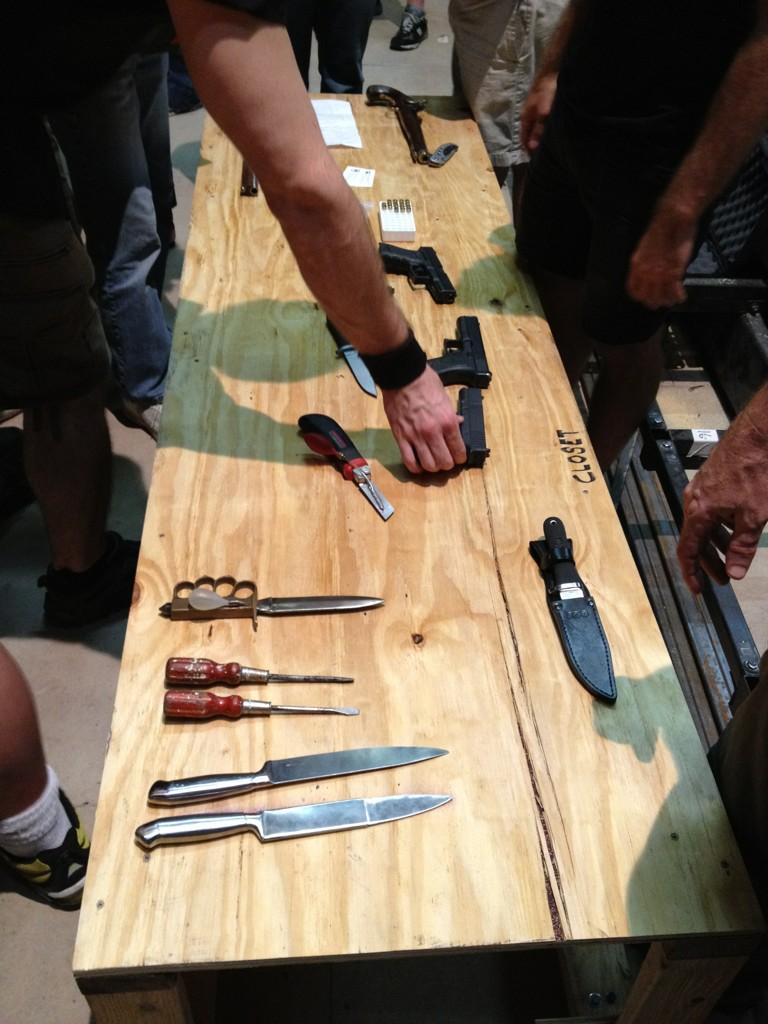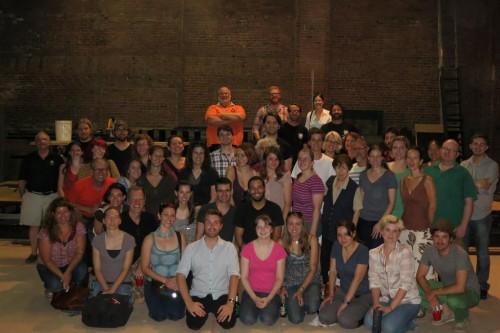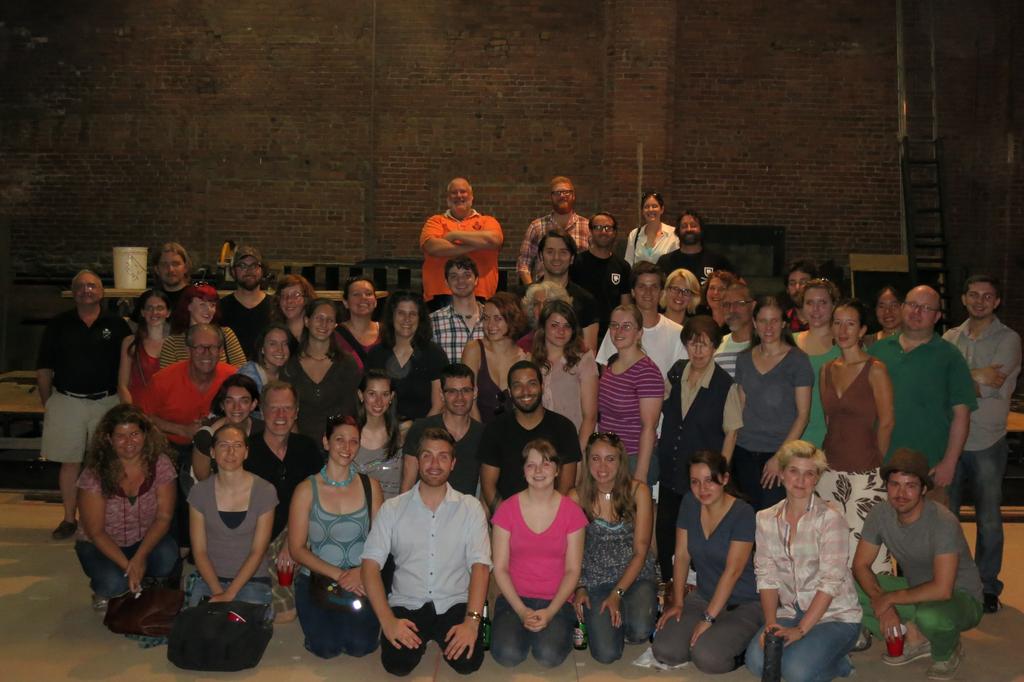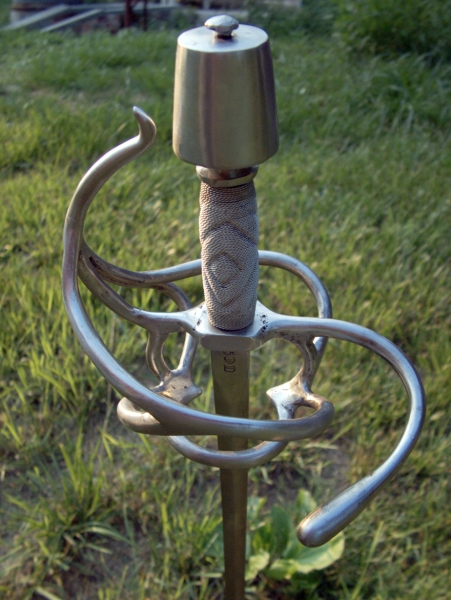This week, The Great Game is playing. We had to rent a number of guns for the show, including some blank-firing ones. Now, New York City has some of the more strict gun-control laws in the US, and even blank-firing replica firearms require a “theatrical weapons permit” to rent and transport to the theatre. We’ve had a bit of turn-over in our production staff since the last time we had a show with such guns, and it turned out none of us were currently licensed. So I volunteered to be the one to bare my personal life and barter my soul to the New York City Police Department in exchange for permission to make a sound effect from a replica firearm.
As a caveat, what follows is not a “how-to”; using weapons on stage requires so much more than just having a certain license or permit. Your situation would certainly differ from mine, information becomes outdated quickly, and if you do not live or work in New York City, then this is all fairly irrelevant. As I was going through the licensing procedure though, I could not find much anecdotal information about what it’s like, so I thought I would share my tale. For those of you working in theatres outside of New York City, you may find it interesting to see what we have to go through here.
The first part was relatively easy. When we sent the list of firearms we needed to Weapons Specialists, one of our preferred–weapon rental vendors, they told us that whoever would pick-up and sign for the guns would need a theatrical weapons permit. They gave me the relevant information to get started and even have links on their website to the official instructions and forms from the NYPD. This is one of the benefits of using a supplier like Weapons Specialists; they will make sure you have all your legal ducks in a row. The kinds of prop and replica firearms that require a license to rent and transport are registered and tracked by the NYPD just like real guns, so you should never have to “guess” whether you should have a license or not; your supplier will tell you if you do. Still, it is a good idea to know what kinds of weapons require a license going into a new production so you can let the team know whether a gun they are requesting will require a license, which entails either hiring someone with a license, or allowing enough time and money in the budget to apply for one.
You can view the form here and the special instructions for the theatrical permit here. As you can see, you fill out the exact same form as if you were applying for a rifle/shotgun license; this might be confusing and even scary for the first-timer, but rest assured, you are getting an entirely different license. When I got mine, it was $140 for the license. You also have a number of forms you need to have notarized. We have our own in-house notary, so those costs were absorbed by the institution and did not come out of our budget, but otherwise you would need to be prepared to budget for those costs as well.
The proof of address was one of the trickier and more confusing parts. You need to bring your Social Security card and your passport or driver’s license, but you also need additional documentation for your address; they will not accept your driver’s license itself as proof. On the website, it says that can be a recent copy of a gas, electric or land-line telephone bill. If those are in someone else’s name, like a roommate or family member you can use a copy of their bill along with a form that is also notarized stating that person knows you are applying for a license.  I called the rifle/shotgun office to see what else they would accept. They’ve updated their rules as less and less people have land-line telephones; they will now accept a cable or internet bill in conjunction with your driver’s license, provided the addresses on each are the same. They will also take a notarized copy of your lease.
It took quite a while to get all the paperwork and documentation together, as there is a lot of pieces and parts, and you need to have other people fill out parts and write letters and what-not. Eventually, I had it all ready. I gave the NYPD permission to check my arrest record, as well as checking with mental institutions to make sure I was never officially crazy. I even had my supervisor agree that he would be responsible for my guns if I should die—on a form he had to sign in front of a witness. I felt like I was only one step away from having to gather three selectmen of good repute to forswear my strong character in front of a judge.
I left for my permit early one Friday morning. I needed to go out to a courthouse in Kew Gardens, Queens, where the NYPD’s rifle/shotgun division is located. It’s quite a distance from the Public Theater, but not terribly far from my apartment, so it made sense to do it first thing in the morning. Though the office says it is open from 8:30am to 4:00pm, the courthouse itself says it doesn’t open until 9:00am. Like every government building in New York City, I had to go through a metal detector upon entering—good thing I remembered to leave my work-knife at home! The office itself is found in the basement, where apparently nobody goes. Having dealt with jury duty, the DMV, the FDNY records department and other bureaucratic departments in the city, I was expecting more activity. Even when I got a copy of my birth certificate in Brooklyn, I had to wait in line. This place, on the other hand, was practically deserted. I struggled to follow the signs leading the way through the winding hallways underneath the courtroom. Finally, I saw the words “Rifle/Shotgun Licensing Division” in big block letters on a closed door at the end of a long passageway.
The woman looked through all my forms and paperwork one at a time to make sure they were complete and correct. She photocopied my passport, social security card, and utility bill before handing them back. Once she seemed satisfied, she asked me to wait outside for a few minutes.
The makeshift waiting room was actually just a vestibule created by various hallways joining together. I sat on the only bench in the small area, which was so long it covered half of one of the doors. I waited for about twenty minutes, completely alone except for the two times a janitor passed through. Eventually, I was called back in.
When you get a permit for a real rifle or shotgun, you hand in all your paperwork, get fingerprinted, and then come back three to six months later once your fingerprints have cleared all their background checks. For the theatrical permit, you walk off with the license on the same day. The woman had gathered all my paperwork into a single folder which I assumed they would keep on file there for eternity. She had me stand in front of a blank background, and a camera mounted to the wall took my picture. I signed my name on an electric pad so my signature showed up on her computer. The chain for the pen had long disappeared, and it had been replaced by a string of rubber-bands tied together. Finally, I placed my thumb on another device which scanned my thumb-print and saved it to the same computer. After the woman typed through a few more options, I heard the printer kick into action printing up my permit card. A few moments later, she showed me the card to check for accuracy. Satisfied, she photocopied the card and had me sign that copy, which she placed in my folder. All told, I was at the courthouse for about an hour.
The day came to pick up the guns from Weapons Specialists. We looked through the guns and checked to make sure everything was complete. For the three guns which required the license, he had to write down their serial numbers for another form. I had to fill out another form as well; this was a federal from from the ATF for the actual transfer of the firearms. This was similar to forms I had already completed, but it included a series of additional questions, some quite bizarre—I had to swear I had never renounced my citizenship to the US and that I never threatened a child, for example. Once the form was complete and my license was photocopied, he had to call in to the rifle/shotgun division and check my license against their records. All in all, I don’t think I’ve ever had my legitimacy as a law-abiding citizen so closely scrutinized.
Part of the application process includes getting a notarized letter from an officer of my production company listing the types of guns being used and for what purpose. The license itself is valid for a year. I asked Weapons Specialist whether the license is only valid for the guns I listed on that letter. He said that you need a specific reason to apply for the license, but once you have it, it can be used to rent and use other guns for other productions. Also, the license allows me to rent, buy, acquire, transport and possess special theatrical guns, but once at the venue, anyone can load and operate them.





